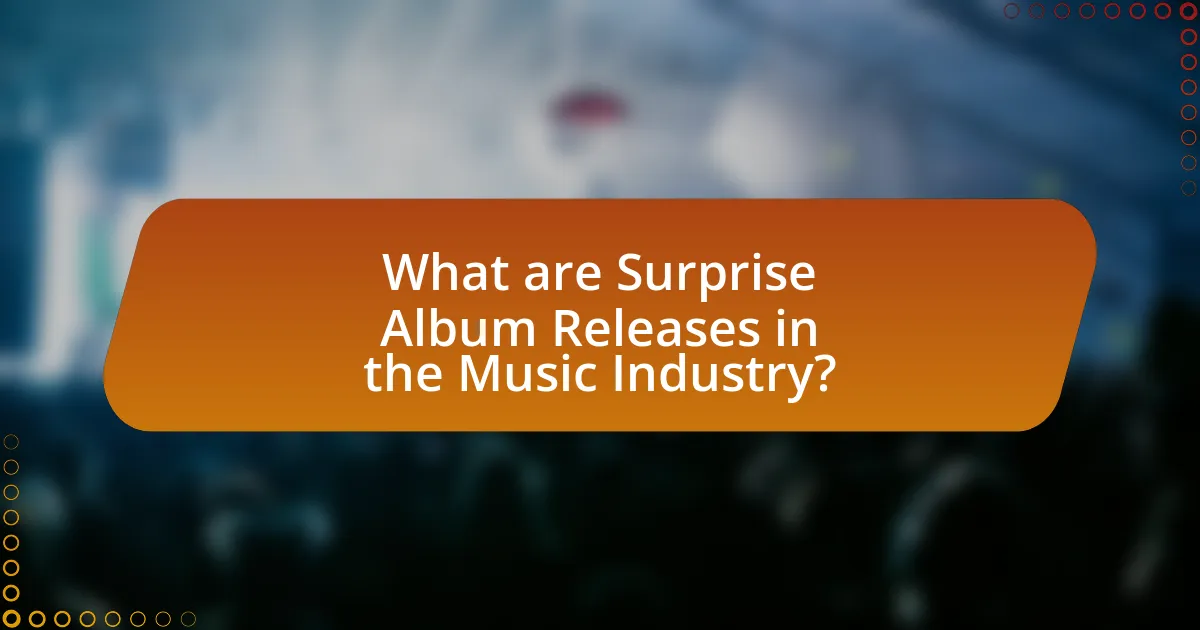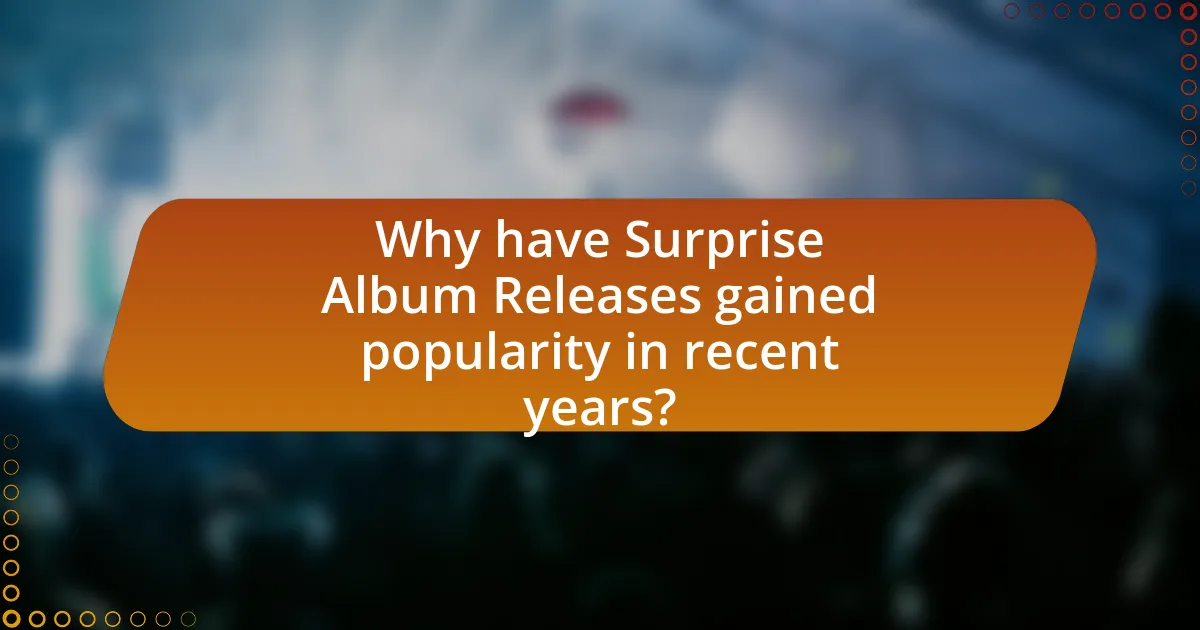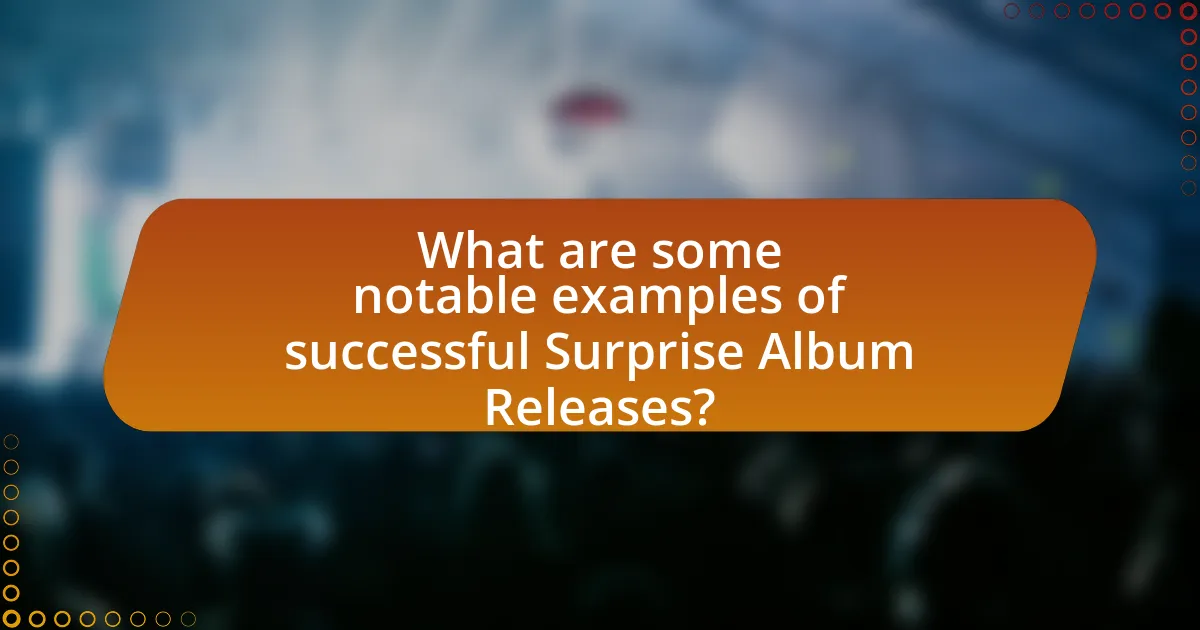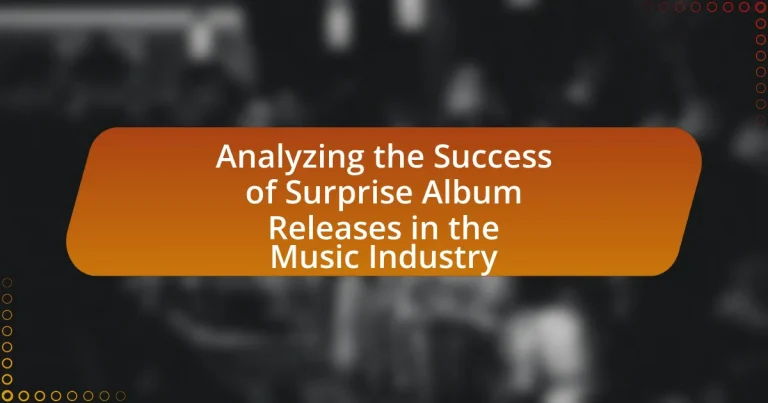Surprise album releases in the music industry refer to albums launched without prior announcements or marketing campaigns, creating immediate buzz and engaging fans. This article analyzes the effectiveness of this strategy, highlighting key characteristics, differences from traditional releases, and notable examples such as Beyoncé’s self-titled album and Taylor Swift’s “Folklore.” It explores the impact of surprise releases on album sales, streaming numbers, and fan engagement, emphasizing the role of social media in amplifying these effects. Additionally, the article discusses the factors contributing to the rise of this trend and offers insights into best practices for artists considering surprise releases.

What are Surprise Album Releases in the Music Industry?
Surprise album releases in the music industry are albums that artists release without prior announcement or marketing campaigns. This strategy creates immediate buzz and engages fans by delivering unexpected content, often leading to increased sales and streaming numbers. For instance, Beyoncé’s self-titled album released in December 2013 without any promotion debuted at number one on the Billboard 200 and sold over 600,000 copies in its first week, demonstrating the effectiveness of this approach.
How do Surprise Album Releases differ from traditional album releases?
Surprise album releases differ from traditional album releases primarily in their marketing strategy and timing. Traditional album releases typically involve extensive pre-release promotion, including singles, music videos, and interviews, which build anticipation over months. In contrast, surprise album releases are announced with little to no prior notice, often dropping the entire album suddenly, as seen with Beyoncé’s self-titled album in 2013, which was released without any prior announcement and led to significant commercial success. This approach capitalizes on the element of surprise, creating immediate buzz and engagement, as evidenced by Taylor Swift’s “Folklore,” which was released unexpectedly in July 2020 and quickly topped charts worldwide.
What are the key characteristics of a Surprise Album Release?
A Surprise Album Release is characterized by its unexpected announcement and immediate availability to the public. This approach creates a sense of urgency and excitement among fans, often leading to increased sales and streaming numbers. For instance, Beyoncé’s self-titled album released in 2013 without prior promotion exemplifies this strategy, resulting in over 800,000 copies sold in its first three days. Additionally, surprise releases often leverage social media for instant communication, enhancing fan engagement and media coverage. This method disrupts traditional marketing timelines, allowing artists to maintain creative control and respond quickly to cultural moments.
Why have artists chosen to adopt this release strategy?
Artists have chosen to adopt the surprise album release strategy to create immediate buzz and engage their audience effectively. This approach leverages the element of surprise, which can lead to heightened media attention and social media discussions, as seen with Beyoncé’s self-titled album in 2013 that generated significant online conversation and sales within hours of release. Additionally, surprise releases can circumvent traditional marketing timelines, allowing artists to maintain creative control and respond quickly to current trends or personal circumstances, as demonstrated by artists like Frank Ocean and Taylor Swift, who have successfully utilized this strategy to enhance their visibility and connect with fans directly.
What impact do Surprise Album Releases have on the music market?
Surprise album releases significantly disrupt traditional music marketing strategies and create immediate spikes in sales and streaming activity. For instance, Beyoncé’s surprise album release in 2013 led to over 800,000 downloads in just three days, showcasing the potential for rapid consumer engagement. Additionally, these releases often generate extensive media coverage and social media buzz, amplifying visibility and driving further interest in the artist’s work. The unpredictability of surprise releases can also challenge established promotional timelines, forcing record labels to adapt quickly to capitalize on the momentum generated by such announcements.
How do these releases affect album sales and streaming numbers?
Surprise album releases significantly boost album sales and streaming numbers. For instance, when Beyoncé released her self-titled album unexpectedly in 2013, it sold over 600,000 copies in its first three days and broke streaming records on platforms like Spotify and iTunes. Similarly, Taylor Swift’s surprise release of “Folklore” in 2020 led to over 800,000 album sales in its first week, making it the best-selling album of that year. These instances demonstrate that surprise releases create immediate consumer interest and urgency, leading to heightened sales and streaming activity.
What role does social media play in the success of Surprise Album Releases?
Social media is crucial for the success of surprise album releases as it facilitates immediate and widespread communication between artists and their fans. Platforms like Twitter, Instagram, and TikTok enable artists to announce releases spontaneously, generating buzz and excitement in real-time. For instance, Beyoncé’s surprise album “Lemonade” in 2016 saw a significant spike in sales and streaming, largely attributed to her strategic use of social media to create anticipation and engage her audience directly. This direct engagement leads to increased visibility and can result in viral moments, amplifying the album’s reach and impact.

Why have Surprise Album Releases gained popularity in recent years?
Surprise album releases have gained popularity in recent years primarily due to their ability to create immediate buzz and engage audiences in a novel way. This strategy allows artists to bypass traditional marketing cycles, generating excitement and anticipation through unexpected announcements. For instance, Beyoncé’s self-titled album in 2013, released without prior promotion, exemplified this trend, achieving significant commercial success and influencing other artists to adopt similar tactics. The rise of social media platforms further amplifies this effect, enabling rapid sharing and discussion among fans, which enhances visibility and drives sales.
What factors contribute to the rise of Surprise Album Releases?
The rise of surprise album releases is primarily driven by the evolution of digital distribution and social media engagement. Digital platforms allow artists to bypass traditional marketing strategies, enabling immediate access to their music. For instance, Beyoncé’s self-titled album in 2013, released without prior announcement, exemplified this shift, achieving over 800,000 sales in its first three days. Additionally, the element of surprise creates buzz and excitement, leading to increased media coverage and fan engagement, as seen with Taylor Swift’s surprise releases that consistently dominate streaming charts. This combination of direct-to-fan distribution and heightened anticipation contributes significantly to the trend’s growth in the music industry.
How has the digital landscape influenced this trend?
The digital landscape has significantly influenced the trend of surprise album releases in the music industry by enabling instant access and widespread distribution. With platforms like Spotify and Apple Music, artists can release music directly to consumers without traditional marketing delays, allowing for immediate engagement and buzz. For instance, Beyoncé’s surprise album release in 2013 generated over 800,000 downloads in just three days, showcasing how digital platforms can amplify the impact of unexpected releases. This immediacy and accessibility have reshaped consumer expectations and artist strategies, making surprise releases a viable and often successful marketing tactic.
What are the benefits for artists in releasing albums unexpectedly?
Releasing albums unexpectedly allows artists to create a significant buzz and engage their audience more effectively. This strategy often leads to heightened media attention and social media discussions, which can amplify the album’s reach. For instance, Beyoncé’s surprise release of her self-titled album in 2013 resulted in over 828,000 copies sold in the first three days, demonstrating the potential for immediate commercial success. Additionally, unexpected releases can enhance the artist’s brand by positioning them as innovative and unpredictable, which can attract new listeners and retain existing fans. This approach also circumvents traditional marketing timelines, allowing artists to capitalize on current trends and cultural moments, further increasing relevance and impact.
How do fans respond to Surprise Album Releases?
Fans typically respond to surprise album releases with excitement and enthusiasm. This immediate reaction is often reflected in social media trends, where platforms like Twitter and Instagram see a surge in posts and discussions about the album. For instance, when Beyoncé released her surprise album “Lemonade” in 2016, it generated over 1.2 million tweets within 12 hours, showcasing the intense fan engagement. Additionally, surprise releases often lead to increased streaming numbers; for example, Taylor Swift’s surprise album “Folklore” broke Spotify’s record for the most-streamed album in a single day upon its release in 2020. This indicates that fans not only express their excitement but also actively consume the music, contributing to its commercial success.
What emotions do Surprise Album Releases evoke in listeners?
Surprise album releases evoke a range of emotions in listeners, primarily excitement, joy, and anticipation. These emotions stem from the unexpected nature of the release, which creates a sense of novelty and thrill. Research indicates that surprise elements in music can enhance emotional responses, as listeners often feel a heightened sense of engagement and connection to the artist. For instance, when Beyoncé released her self-titled album unexpectedly in 2013, it generated significant buzz and excitement, leading to a surge in social media discussions and streaming activity. This illustrates how surprise releases can effectively elicit strong emotional reactions, reinforcing the bond between the artist and the audience.
How does anticipation affect fan engagement with Surprise Album Releases?
Anticipation significantly enhances fan engagement with surprise album releases by creating heightened excitement and emotional investment. When artists announce surprise albums, the lack of prior information generates curiosity and speculation among fans, leading to increased social media discussions and sharing. For instance, Beyoncé’s surprise album “Lemonade” in 2016 resulted in a 200% increase in Twitter activity related to her, demonstrating how anticipation can drive engagement metrics. This engagement is further amplified by the immediacy of the release, as fans rush to listen and share their reactions, fostering a communal experience that strengthens their connection to the artist.

What are some notable examples of successful Surprise Album Releases?
Notable examples of successful surprise album releases include Beyoncé’s self-titled album “Beyoncé,” released in December 2013, which debuted at number one on the Billboard 200 and sold over 600,000 copies in its first three days. Another example is Taylor Swift’s “Folklore,” released in July 2020, which received critical acclaim and topped charts globally, selling over 1.3 million copies in its first week. Additionally, Radiohead’s “In Rainbows,” released in October 2007 as a pay-what-you-want download, garnered significant attention and sold over 3 million copies in its first year. These releases demonstrate the effectiveness of surprise strategies in generating immediate sales and media buzz.
Which artists have successfully utilized this strategy?
Beyoncé and Radiohead have successfully utilized the strategy of surprise album releases in the music industry. Beyoncé’s self-titled album, released in December 2013 without prior announcement, debuted at number one on the Billboard 200 and sold over 600,000 copies in its first week. Similarly, Radiohead’s album “In Rainbows,” released in 2007 as a pay-what-you-want download, garnered significant attention and sold over three million copies in its first year, demonstrating the effectiveness of this strategy in generating buzz and driving sales.
What specific albums have made a significant impact upon surprise release?
Beyoncé’s self-titled album “Beyoncé,” released in December 2013, made a significant impact upon its surprise release, as it debuted without prior announcement and included visual components for each track, leading to over 600,000 copies sold in its first three days. Another notable example is Radiohead’s “In Rainbows,” released in October 2007 as a pay-what-you-want download, which garnered widespread attention and discussion about music distribution models, resulting in over 3 million downloads in its first year. Additionally, Taylor Swift’s “Folklore,” released in July 2020, surprised fans with its indie-folk sound and became the best-selling album of 2020 in the U.S., selling over 1.3 million copies in its first week. These albums exemplify how surprise releases can disrupt traditional marketing strategies and achieve commercial success.
How did these artists promote their Surprise Album Releases?
Artists promoted their surprise album releases primarily through social media announcements and strategic partnerships. For instance, Beyoncé utilized Instagram to reveal her self-titled album in 2013, generating immediate buzz and engagement among her followers. Similarly, Taylor Swift announced her surprise album “Folklore” via Twitter, which led to significant media coverage and fan excitement. These methods effectively leveraged their existing fan bases and social media platforms to create a viral marketing effect, resulting in high first-week sales and streaming numbers.
What lessons can be learned from successful Surprise Album Releases?
Successful surprise album releases demonstrate the effectiveness of strategic marketing and audience engagement. These releases often create immediate buzz and excitement, as seen with Beyoncé’s self-titled album in 2013, which sold over 600,000 copies in its first three days due to its unexpected launch. Additionally, surprise releases can leverage social media for rapid dissemination, as evidenced by Chance the Rapper’s “Coloring Book,” which gained significant traction through platforms like Twitter and Instagram. This approach fosters a sense of exclusivity and urgency, encouraging fans to engage quickly. Furthermore, successful surprise releases often reflect an artist’s authenticity and willingness to innovate, which can strengthen their brand and deepen fan loyalty.
What strategies can emerging artists adopt from these examples?
Emerging artists can adopt the strategy of leveraging surprise album releases to create buzz and engage their audience effectively. This approach has been validated by successful artists like Beyoncé and Radiohead, who utilized unexpected releases to generate significant media attention and fan excitement. For instance, Beyoncé’s self-titled album in 2013, released without prior promotion, resulted in over 800,000 copies sold in the first three days, demonstrating the potential for immediate commercial success. Additionally, emerging artists can utilize social media platforms to enhance their reach and foster a direct connection with fans, as seen in the strategies employed by these established artists.
How can artists measure the success of their Surprise Album Releases?
Artists can measure the success of their surprise album releases through metrics such as first-week sales, streaming numbers, and social media engagement. First-week sales provide a clear indicator of commercial success, with notable examples like Beyoncé’s self-titled album, which sold over 600,000 copies in its first week, demonstrating the impact of surprise releases on sales figures. Streaming numbers on platforms like Spotify and Apple Music can also reflect listener engagement and popularity, as seen with Taylor Swift’s surprise album “Folklore,” which broke streaming records upon release. Additionally, social media engagement, including mentions, shares, and fan reactions, can gauge public reception and buzz surrounding the release, further illustrating its success in the music industry.
What best practices should artists consider for future Surprise Album Releases?
Artists should consider strategic planning, audience engagement, and effective marketing for future surprise album releases. Strategic planning involves selecting the right timing and ensuring that the album aligns with current trends or events, as seen with Beyoncé’s self-titled surprise album in 2013, which generated significant buzz and sales. Audience engagement is crucial; artists should leverage social media platforms to create anticipation and excitement without revealing details, similar to how Taylor Swift utilized cryptic messages before her surprise releases. Effective marketing includes utilizing pre-release teasers and exclusive content to drive interest, as demonstrated by Radiohead’s approach with their surprise album “A Moon Shaped Pool,” which included unique promotional strategies that captivated fans. These practices enhance visibility and maximize the impact of surprise releases in the competitive music industry.


